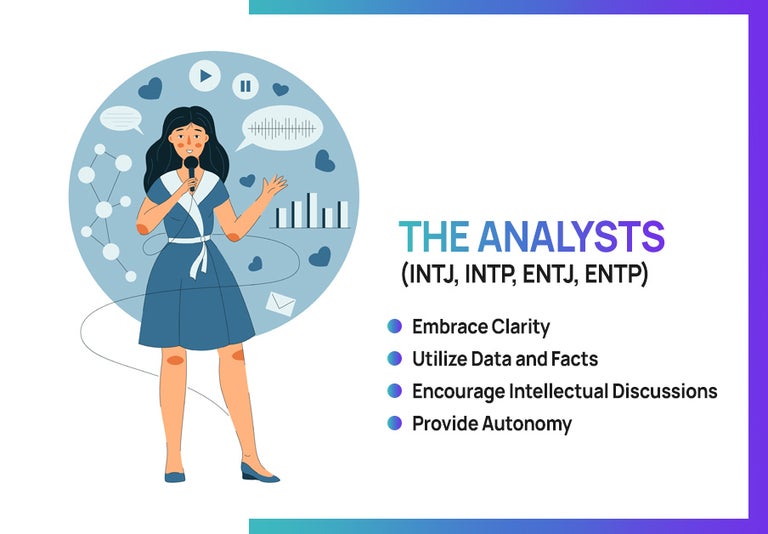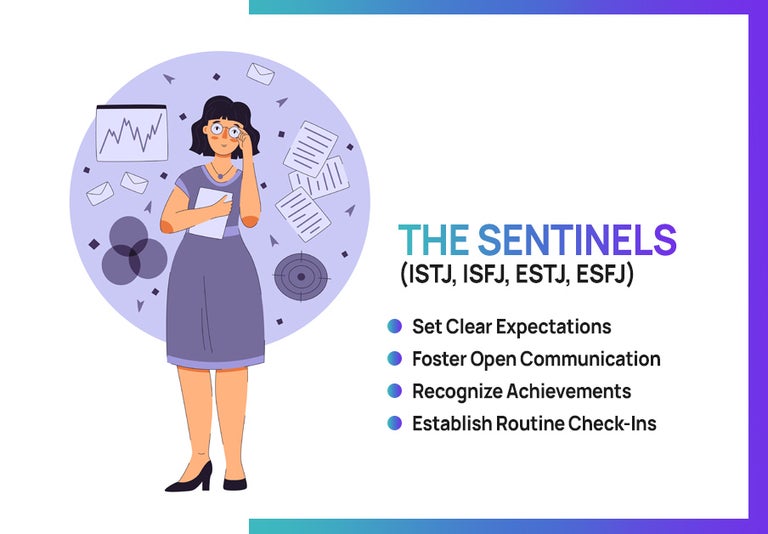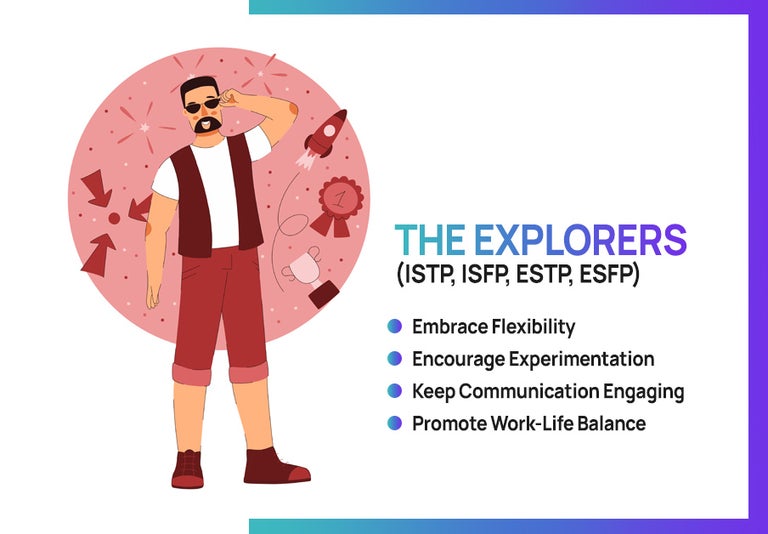Contents
- I. The Analysts (INTJ, INTP, ENTJ, ENTP)
- II. The Diplomats (INFJ, INFP, ENFJ, ENFP)
- III. The Sentinels (ISTJ, ISFJ, ESTJ, ESFJ)
- IV. The Explorers (ISTP, ISFP, ESTP, ESFP)
- Remote Communication: What Each MBTI Type is Most Likely to Say
In today's crazy virtual landscape, effective remote communication is crucial for success. But did you know that your MBTI (Myers-Briggs Type Indicator) holds valuable clues about your communication style?
By understanding the unique communication preferences of different MBTI personality types, remote managers can enhance their collaboration strategies and foster stronger connections with their remote teams.
In this article, we’ll delve into each of the four MBTI groups and explore their communication styles, providing practical tips for remote managers in each category.
Let's explore remote communication through the lens of the MBTI.
I. The Analysts (INTJ, INTP, ENTJ, ENTP)
Analyst managers: your remote communication style is characterized by an analytical, logical, and strategic approach. You value precision and prefer to convey information succinctly.

Here are some remote communication tips tailored for analyst managers:
1. Embrace Clarity: Be direct and concise in your remote communications. Clearly outline objectives, expectations, and deliverables to avoid misunderstandings.
Tip! Use asynchronous communication to improve remote employee speed, but keep big-picture conversations for video calls (synchronous communication).
2. Utilize Data and Facts: Back up your ideas with data and evidence to convince your remote team members. Presenting logical reasoning helps gain their trust and buy-in. Written communication prevents those communication challenges.
3. Encourage Intellectual Discussions: Create a virtual space where remote teams can engage in thought-provoking discussions. Foster an environment that values intellectual exchange and encourages innovative thinking. Analysts who prioritize communication tools that encourage discussion, win.
4. Provide Autonomy: Analysts thrive when they have the freedom to work independently. Trust your remote worker's expertise and provide them with the autonomy they need to excel. Google Drive, Microsoft Teams - these are great collaboration tools that inspire autonomy.
II. The Diplomats (INFJ, INFP, ENFJ, ENFP)
Diplomat managers: your remote communication style is characterized by empathy, vision, and inspiration. You prioritize the emotional well-being of your team members and aim to create a harmonious work environment.

Here are some remote work communication tips built for diplomat managers:
1. Show Empathy: Take the time to listen and understand your team members' perspectives. Acknowledge their feelings and provide support when needed. This will be needed if you have both remote and hybrid teams.
2. Inspire and Motivate: Use storytelling and vision-driven communication to inspire your remote workers. Paint a vivid picture of the team's goals and how their contributions make a difference. Recognition doled out during video conferencing works a treat.
3. Foster Collaboration: Diplomat managers excel at building connections. Encourage remote collaboration and create opportunities for team building - with safe spaces to share ideas and workflows.
4. Provide Meaningful Feedback: Offer constructive feedback to your remote employees in a compassionate manner. Focus on individual growth and highlight their strengths while providing guidance for improvement. This can be done in private communication channels and virtual in-person meetings.
III. The Sentinels (ISTJ, ISFJ, ESTJ, ESFJ)
Sentinel managers: your remote communication style is characterized by organization, responsibility, and support. You prioritize stability and strive to create a structured work environment at your remote company.

Here are some remote team communication tips designed for sentinel managers:
1. Set Clear Expectations: Provide detailed instructions and clearly define goals and deadlines. Sentinels appreciate structure and thrive when they know what is expected of them. Communicate effectively using async tools for better remote project management.
2. Foster Open Communication: Create a supportive atmosphere where team members feel comfortable expressing their concerns or seeking guidance. Be accessible and approachable for any questions they may have. That way they won't feel isolated when working remotely on your team.
3. Recognize Achievements: Sentinels value recognition for their hard work. Celebrate team accomplishments and acknowledge individual contributions to boost morale and motivation. Team meetings are a great place to recognize the contributions of a remote worker.
4. Establish Routine Check-Ins: Regularly touch base with your team members to ensure they have the necessary resources and support. Scheduled check-ins provide a sense of stability and reassurance. This will grow your communication skills and result in a dialed-in team.
IV. The Explorers (ISTP, ISFP, ESTP, ESFP)
Explorer managers: your remote communication style is characterized by adaptability, creativity, and energy. You thrive in dynamic environments and enjoy exploring new possibilities.

Here are some remote working communication tips created for explorer managers:
1. Embrace Flexibility: Adapt your communication style to accommodate the diverse needs and preferences of your team members. Be open to exploring new ideas and approaches.
2. Encourage Experimentation: Create a culture that values creativity and encourages team members to think outside the box. Provide opportunities for them to experiment and innovate.
3. Keep Communication Engaging: Explorers appreciate lively and interactive communication. Incorporate multimedia elements, such as videos, instant messaging or interactive presentations, to keep your remote meetings and updates engaging.
4. Promote Work-Life Balance: Recognize the importance of maintaining a healthy work-life balance. Encourage your team members to take breaks, pursue hobbies, and recharge, fostering their overall well-being.
Understanding which styles of communication are present in your remote team environment can bring you closer together. Play to each other’s strengths and you'll be making magic in no time.
Remote Communication: What Each MBTI Type is Most Likely to Say
How does communication in remote teams manifest for your type? See if you recognize what your MBTI type is most likely to say while on the job.
1. INTJ: The Remote Architect
"Based on my calculations, let's execute this plan and conquer the remote realm!"
2. INTP: The Tech Innovator
"I've hacked into the matrix of remote work and discovered a virtual gold mine!"
3. ENTJ: The Virtual Trailblazer
"Let's set goals so audacious that even our webcams raise their eyebrows."
4. ENTP: The Digital Maverick
"I have a crazy idea for our new remote project. Brace yourselves, folks!"
5. INFJ: The Virtual Oracle
"I sense a disturbance in the team. Let's address it before it goes nuclear."
6. INFP: The Remote Visionary
"Picture this: remote work, unicorns, and rainbows colliding to create pure awesomeness!"
7. ENFJ: The Virtual Catalyst
"Our remote team has the power to change the world. Let's start a virtual revolution!"
8. ENFP: The Remote Firecracker
"I've found a virtual party game that will make us laugh harder than our mute buttons can handle!"
9. ISTJ: The Remote Architect
"I propose a systematic approach to remote work that will leave no GIF unshared!"
10. ISFJ: The Remote Guardian
"I'm here to provide virtual hugs and snacks for everyone's emotional well-being."
11. ESTJ: The Organizer of Virtual Realms
"Let's create a remote meeting agenda so fabulous that it deserves its own Netflix series!"
12. ESFJ: The Remote Cheerleader
"Give me a virtual 'Woo-hoo!' if you're ready to rock this remote project together!"
13. ISTP: The Virtual Maverick
"In this wild world of remote work, let's be flexible like a yogi doing a downward dog on a video call."
14. ISFP: The Creative Muse
"Prepare for a virtual presentation so captivating that unicorns will ask how I made it shine!"
15. ESTP: The Remote Dynamo
"I suggest a virtual dance party to get our remote productivity grooving like never before!"
16. ESFP: The Remote Engager
"Who needs a virtual team-building exercise when we can have a virtual water balloon fight? Bring it on!"
Your Remote Communication Style in Action
Understanding your remote communication style is a powerful tool for remote managers.
By recognizing the preferences and strengths of each MBTI personality type, you can tailor your async communication strategies to foster meaningful connections, promote collaboration, and inspire your team members.
Embrace the diversity of communication styles within your remote team, and unleash the full potential of your MBTI personality type to become an effective and respected remote manager.
Remember, effective remote communication is the key to building strong virtual relationships and achieving shared goals.







